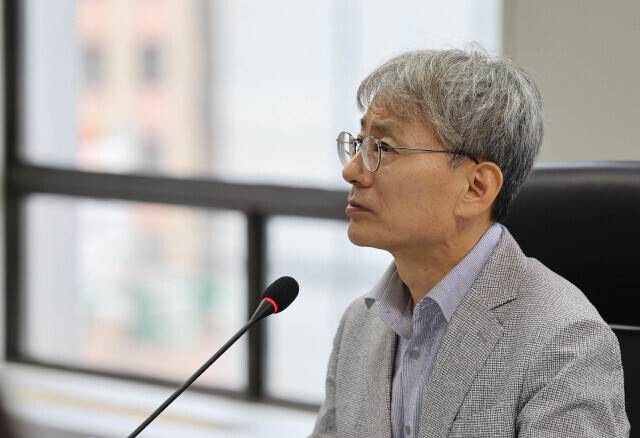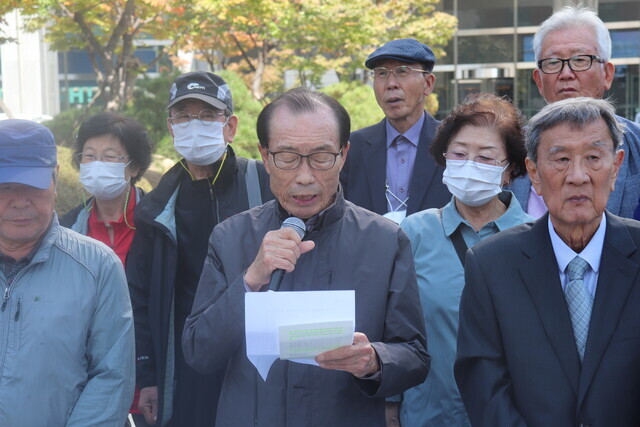hankyoreh
Links to other country sites 다른 나라 사이트 링크
Head of Korean truth commission suggests war entails summary executions

While meeting with bereaved family members of victims of civilian massacres during the Korean War, Kim Kwang-dong, the chairperson of the Truth and Reconciliation Commission, reportedly made a statement claiming that individuals may be killed without trial during times of war. The remark is stirring criticism, as it goes directly against the commission’s official position that wartime civilian massacres by police constitute “clear criminal acts,” in addition to contradicting the martial law system that was in place during the Korean War.
On Wednesday, Kim Man-deok, the president of the Yeongcheon branch of an association of bereaved family members of people killed in post-Korean War civilian massacres, told the Hankyoreh, “During a talk with bereaved families in Yeongcheon on Tuesday, Kim Kwang-dong spoke to the effect that the military and police can kill red elements and communists who committed arson and murder during wartime, when they can neither be tried nor ruled by law.”
Kim Man-deok continued that when he asked how someone can be killed for merely being charged with a crime or harboring communist ideologies without any legal proceedings or judgment, the TRC chairperson responded that during a war like the Korean War, that can be the case, as trials cannot take place.
The Yeongcheon Bodo League incident refers to the summary execution of roughly 600 individuals including members of the Bodo League (also known as the National Guidance Alliance) by police and the South Korean soldiers from July to September 1950 due to concerns that they might sympathize with the North Korean People’s Army.
Although the Truth and Reconciliation Commission finished its investigation and completed its outcome report, members of the commission who were recommended to serve by the ruling party have been putting off setting its review as a subcommittee agenda based on the grounds that murder and arson are recorded as reasons for the execution of victims on records made by Yeongcheon police in 1979. However, these records in question are considered unreliable, as much circumstantial evidence indicates their falsification in order to justify the executions.
Kim Kwang-dong’s statement appears to have been made while explaining why the investigation report for the incident has been continually deferred.
Kim Kwang-dong’s view directly contradicts judgments the Truth and Reconciliation Commission has made in the past. Regarding the mass execution of civilians by local authorities following orders from the Ministry of Home Affairs’ Bureau of National Security to provincial police bureaus immediately after the outbreak of the Korean War commanding them to arrest and dispose of Bodo League members as well as left-wing offenders in prison, the commission concluded that this constitutes “clear criminal acts” despite having taken place during wartime.

The statement that individuals may be killed without trial during wartime also goes against Korea’s Constitution, which stipulates that individuals have the right to be tried according to law, not to mention martial law at the time. “As martial law that was enacted in 1949 stipulates that most criminal cases should be tried even during emergency martial law, executing criminal suspects without trial appears to have violated martial law,” remarked Korea University Law School professor Yi Zoon-il.
Although the Hankyoreh attempted to contact Kim Kwang-dong many times through phone calls and text messages in order to verify this statement and learn its context, he could not be reached for comment.
By Koh Kyoung-tae, senior staff writer
Please direct questions or comments to [english@hani.co.kr]

Editorial・opinion
![[Guest essay] Preventing Korean Peninsula from becoming front line of new cold war [Guest essay] Preventing Korean Peninsula from becoming front line of new cold war](https://flexible.img.hani.co.kr/flexible/normal/500/300/imgdb/original/2024/0507/7217150679227807.jpg) [Guest essay] Preventing Korean Peninsula from becoming front line of new cold war
[Guest essay] Preventing Korean Peninsula from becoming front line of new cold war![[Column] The state is back — but is it in business? [Column] The state is back — but is it in business?](https://flexible.img.hani.co.kr/flexible/normal/500/300/imgdb/original/2024/0506/8217149564092725.jpg) [Column] The state is back — but is it in business?
[Column] The state is back — but is it in business?- [Column] Life on our Trisolaris
- [Editorial] Penalties for airing allegations against Korea’s first lady endanger free press
- [Editorial] Yoon must halt procurement of SM-3 interceptor missiles
- [Guest essay] Maybe Korea’s rapid population decline is an opportunity, not a crisis
- [Column] Can Yoon steer diplomacy with Russia, China back on track?
- [Column] Season 2 of special prosecutor probe may be coming to Korea soon
- [Column] Park Geun-hye déjà vu in Yoon Suk-yeol
- [Editorial] New weight of N. Korea’s nuclear threats makes dialogue all the more urgent
Most viewed articles
- 1Yoon’s broken-compass diplomacy is steering Korea into serving US, Japanese interests
- 2[Guest essay] Preventing Korean Peninsula from becoming front line of new cold war
- 360% of young Koreans see no need to have kids after marriage
- 4[Reporter’s notebook] In Min’s world, she’s the artist — and NewJeans is her art
- 5S. Korean first lady likely to face questioning by prosecutors over Dior handbag scandal
- 6Lee Jung-jae of “Squid Game” named on A100 list of most influential Asian Pacific leaders
- 7After 2 years in office, Yoon’s promises of fairness, common sense ring hollow
- 8AI is catching up with humans at a ‘shocking’ rate
- 9Hybe-Ador dispute shines light on pervasive issues behind K-pop’s tidy facade
- 10Japan says it’s not pressuring Naver to sell Line, but Korean insiders say otherwise